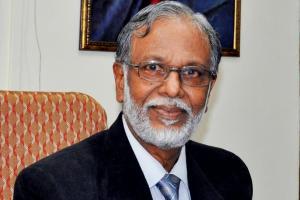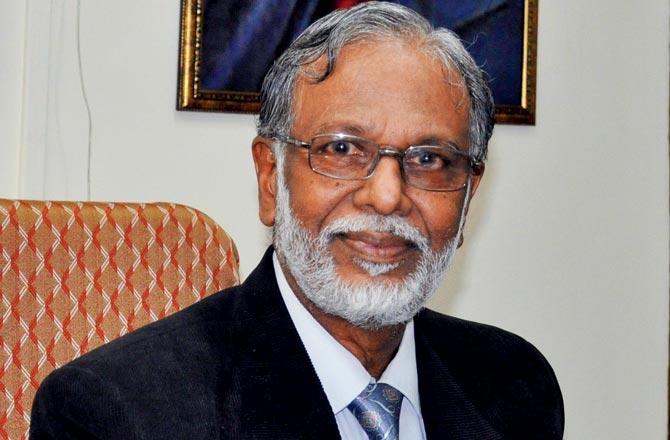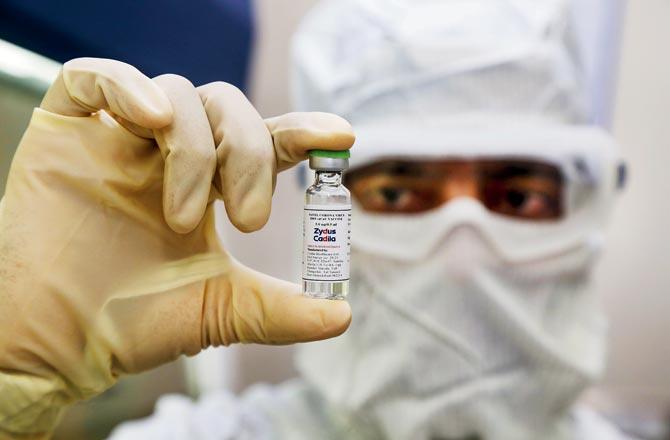Celebrated virologist T Jacob John on COVID-19, herd immunity and the vaccine that may not come by Independence Day

Dr T Jacob John a few years back at the Haffkine Institute
Dr T Jacob John, 84, known globally for his extensive work in the fields of virology and paediatrics, believes China is hiding something about COVID-19. Dr John, who headed the ICMR Centre of Advanced Research in Virology and the National HIV/AIDS Reference Centre, at the Christian Medical College, Vellore, where he set up the country's first diagnostic virology laboratory, tells Vinod Kumar Menon why he feels so, the challenge in making a vaccine, and the possible announcement of the same on August 15.
ADVERTISEMENT
What is your view about COVID-19? Is it man made or natural, and if natural, when and where did it first originate?
In 2013, investigators had looked for bat viruses in Yunan Province in caves and had detected a coronavirus which matches 96.2% genetically with SARS-CoV-2. So it is most likely to be a natural bat virus. How the bat virus got into humans in Wuhan is unknown, unexplained. Yunan bats do not fly over Wuhan. Live bats were not sold in the Wuhan market. Either the infection did not start in Wuhan or it could have accidentally infected humans in the Wuhan Virology Institute where research on coronaviruses was going on. I suspect China has not told the world the truth, all the truth and nothing but the truth.
Is the genome of this novel Coronavirus fixed?
The genome is well studied and remains essentially unchanged the world over. It is one single strand of RNA. During replication in humans, minor mutations occur in the genome but not sufficient to change its general biologic properties. The qualities of easy transmission between humans and the disease-causing virulence remain so far unchanged. In other words the "crucial" is fixed, but the "irrelevants" are changing.

Dr T Jacob John a few years back at the Haffkine Institute
Is the novel Coronavirus strain the same world over?
Virologists use the word strain to mean slightly different things. In terms of the general biologic properties, the virus is one and the same the world over, so far. So, for general understanding, yes, it is one strain the world over, That is reassuring in that vaccine made against any virus isolate should induce immunity against any other in any geographic location. However, genome studies can identify the past parentage of different virus isolates. Thus one can trace the geographic source and growth of individual virus isolates. Put simply, the parts I called irrelevant can be used like fingerprint to trace lineages.
Has the phenomena of antigenic drift (involves the accumulation of a series of minor genetic mutations) and shift (involves mixing of genes from influenza viruses from different species), as is usually seen in flu viruses, resulted in the pandemic?
No, not at all. We expect antigen stability in SARS-CoV-2 without the drift and shift phenomena exhibited by flu viruses. There is hardly any virus other than flu with that problem. Antigen drift or minor changes that don't make the virus a perfect fit to any antibody already made, is a phenomenon with HIV. But we do not have a vaccine against HIV. We do not expect such any problems with the SARS-CoV-2 at all.

A pharmaceutical worker shows a shot of a vaccine developed by Zydus Cadila to treat COVID-19 after it received approval from the Drug Controller General of India to start phase one and two of human clinical trials, in Ahmedabad recently. Pic/AFP
Do you think India will be able to launch its own vaccine by August 15?
When you say 'India launching a vaccine', let me say, that to the best of my knowledge there is no government programme to make a vaccine. I don't think the government has even made any financial or intellectual investments towards the design and development of a vaccine against SARS-CoV-2. But I understand that the National Institute of Virology in Pune, which is an ICMR unit, had supplied a virus isolate to a private vaccine company in Hyderabad that had gone ahead and developed a vaccine candidate. So India's vaccine or vaccines are private sector vaccine industry efforts. There are at least two, possibly 3 vaccine candidates designed indigenously and one vaccine candidate of Oxford-Astra Zeneca research that is assigned to one Indian company for manufacturing to scale and marketing in India and overseas. August 15 of 2020 is less than a month away - it will simply be impossible to launch any of these vaccine candidates as a vaccine approved by the national regulatory agency. A Phase 1 vaccine trial has just started for one vaccine, and even that trial will not be completed by August 15. What the Government of India can declare on 15 August, if it desires to announce some good news, is a firm policy and plan of action to utilise one or more vaccines in the country as soon as available. But that will not be as 'ear-catching' as a vaccine launch. I recall that last August 15 some announcement was made of India putting a man in space - but no further news since then. In Malayalam there is a saying that descries giving of false hope: give an elephant what you want to, but never false hope.
How long would it take for a clinical trial (all three stages) of a vaccine before it gets launched in the global market and in India?
Vaccine development goes through 3 stages. First is the design stage - there are many ways of designing a vaccine - but a company has to choose one or two, based on guidance from their expert advisers. The Bharat Biotech in Hyderabad chose to design a vaccine made of chemically inactivated whole virus particles as the antigen. The second stage is called pre-clinical studies, in which the designed vaccine, with the necessary ingredients for making the antigen stable, is tested in laboratory animals to confirm that the product is safe and induces the desired antibody. With these behind-the-curtain activities, application is made to the National Regulatory Agency for permission to conduct human trials, submitting a very detailed protocol. Once permission is obtained, human trial plans are made and registered with the National Clinical Trial Registry. The third stage is clinical trials in humans. Clinical trials have three phases, 1, 2 and 3. Phase 1 is to investigate product safety in humans and that takes minimum two months. Only after safety is assured, can Phase 2 be conducted - the purpose is to investigate if the product stimulates antibody production in humans. The antigen dose (how many micrograms) and schedule (how many doses) are also tested, so that at the end of Phase 2 you have a definite vaccine candidate, or call it vaccine. Phase 2 needs a minimum of 3 months. If all goes well, Phase 3 has to start, in which a very large number of people, proven to be previously not infected, will be given the vaccine with another large number given a substance looking like the vaccine but with no antigen. The purpose is to investigate if the vaccine will protect against disease - in other words if the antibody raised by the vaccine is effective as a 'prophylactic' or 'protective' vaccine. Phase 3 takes a minimum of 6 months. Add all and we have a minimum of 11 months in human vaccine trials. There is only one way to shorten the time. If the National Regulatory Agency allows Phase 2 to begin before Phase 1 is over and if Phase 3 is allowed before Phase 2 is over, then the 11 months can be telescoped into 9 months. Every phase has to go through Ethics Committee approvals. Will all Indian players work with the fired-up mission objective? We will wait and see how far Indians are 'goal oriented' and 'self-reliant'.
What about these unanswered questions – How soon will immunity against the disease develop? Which age group will the vaccine be safe for? What about complication in different age groups and patients with comorbid issues? And lastly, the duration of protection a vaccine can offer?
There are uncertainties and questions that urgently need answers. If clarity is yet be obtained regarding the immunity parameters following infection and disease, we have to press on with the idea of vaccine in the hope that vaccine-induced immunity can be superior to infection-induced immunity. Vaccines not only mimic nature, that is, making the immune system respond as if infected, they can also surpass nature by inducing immunity that is far superior in protective efficacy than infection-induced immunity. For inactivated viral vaccines, a common mineral salt, like aluminium hydroxide, can enhance antibody response. In many vaccines we use very tiny amounts of such substances and call them adjuvants. Non-infectious vaccines, like the Salk polio vaccine is safe at all ages and for all people, while the Sabin live vaccine is unsafe in children with some immunodeficiency states that are not life-threatening - in them the vaccine-virus causes polio paralysis. Even in normal children Sabin vaccine-viruses cause rare instances of polio paralysis. That is why no rich country allows it in their children. By that corollary, the inactivated SARS-CoV-2 vaccine should be safe in all ages and even in those with co-morbid conditions. Still, it has to be investigated and proven. Senior citizens and those with co-morbid conditions are the ones who have first priority for the COVID-19 vaccine. As for durability of immunity, we will have to wait and see. Since vaccine-induced immunity can be superior to natural immunity, we hope it will also be longer-lasting.
Based on a recent Delhi study, what is your view about the presence of antibodies in individuals who never had COVID-19 symptoms?
Antibody proves past infection. Finding people with no history of symptoms, but evidence of past infection is nothing unusual. The PCR test detects virus in the nose or throat - that is proof of infection. About half those infected have no symptoms and another 15-20% may have very mild symptoms and recover even without treatment. The Delhi study proved all these. It also proved that a large proportion of the infected were never detected. It also proved that the number of deaths reported in Delhi is an under-estimate of true total Covid deaths - because we expect about 1% of all infected will die after going through severe symptoms. In India the infected are often called cases, which creates much confusion. The term case must be confined to those with symptoms whether or not laboratory confirmed.
What is herd immunity? Do you think any state in India or any country in the world has reached herd immunity?
Herd immunity is another much misunderstood phrase. In the science of epidemiology, herd immunity simply means 'the proportion of individuals who are immune in the herd' - the phrase is borrowed from veterinary science. The Delhi antibody survey measured herd immunity as about 23% of the population. Interestingly, when the survey was under way, the Delhi epidemic had peaked and had started to come down. So, serendipitous lesson: we know that 20% herd immunity will signal peak and thereafter decline of the epidemic curve. Or, if epidemic peaked and began coming down in Mumbai, then herd immunity should have been about 20% or more.
Is the immunological response in asymptomatic patient's v/s symptomatic patients the same?
Most reports say that immunological responses are weak in asymptomatic persons - we can't call them patients. But that does not necessarily translate to protection from diseases when re-exposed to infection. My guess is that the lack of symptoms was due to non-invasion of virus into deeper tissues and organs, but infection confined to mucosal surfaces of the nose. We need mode data, better clarity. However, vaccine should induce protective immunity.
Do you think lockdown and sealing of residential buildings has any scientific or medical basis?
These responses also remind me of veterinary practices when there is an outbreak in one herd or corral. When dealing with humans, there are principles of ethics and human rights - these should be respected. Sealing of a residence has no basis in science or medicine. By now we know lockdowns had hardly any effect on the epidemic curve. That is partly because no lockdown can be effective in India for a few reasons, including high population density, need to interact just for survival and mental health. We were not educated by the Central Government why the lockdown was implemented, what its intended purpose was and how people must manage their necessities. To begin with, we are weak on discipline, on the top of it no one has told us authoritative/authentic facts and we are left to believe whatever comes through social media - there is no curb on dis-information, mis-information. After being told unequivocally that the first national lockdown would not be extended beyond April 14, exactly the opposite was done, undermining credibility and trust.
Mumbai managed Dharavi quite well; did the rest of the nation learn the right lessons and adapt them to local situations?
Sealing up a residence reinforces the fear that leads to stigma. All these are signs of prevailing confusion among leaders, right from the very top through all hierarchies.
Will the new coronavirus vaccine be taken yearly like a flu vaccine or it would be a single or double dose for life?
Right now, we can only make intelligent guesses. Annual vaccination for flu is unique to flu, for reasons I do not elaborate here. Most unlikely for COVID. A single dose may have some good effect, but for high immunity that is long-lasting, two doses are probably necessary. For life-long protection, perhaps some additional booster doses may become necessary.
Is it true that China has already started its stage three trial of vaccines and it has even given vaccines to Bangladesh for stage three testing?
I have also read this news. It illustrates two issues - how China acts friendly with weaker countries and how Bangladesh is not looking up to India for friendly help. China is reported to have given the vaccine to Brazil and Mexico also, in the American backyard. We talk a lot; Chinese quietly do things but not seek for external approbations.
More about T Jacob John
He retired as Professor and Head of the Departments of Clinical Virology and Clinical Microbiology. Currently he co-chairs the India expert advisory group on measles and rubella eradication.
He was President of the Indian Association of Medical Microbiologists and President of the Indian Academy of Paediatrics. He is recipient of numerous awards viz BC Roy Award for Eminent Medical Man of the year 1990, and B R Ambedkar Centenary Award 2002.
Dr John had chaired the country's expert advisory group on polio eradication, after his model of polio control in Vellore inspired the global polio eradication programme. He also co-chaired the National Technical Advisory Group on Immunisation from 2000 to 2009.
Catch up on all the latest Mumbai news, crime news, current affairs, and a complete guide from food to things to do and events across Mumbai. Also download the new mid-day Android and iOS apps to get latest updates.
Mid-Day is now on Telegram. Click here to join our channel (@middayinfomedialtd) and stay updated with the latest news
 Subscribe today by clicking the link and stay updated with the latest news!" Click here!
Subscribe today by clicking the link and stay updated with the latest news!" Click here!






